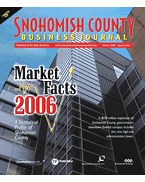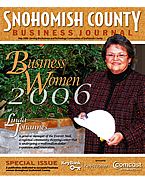 |
|
|
YOUR
COUNTY.
|
YOUR
BUSINESS JOURNAL.
|
EdCC
strives to become
hub for math, science
By
Kimberly Hilden
SCBJ Assistant Editor
Edmonds Community College has, for years, quietly been developing its math and science curriculum into programs that lead to greater opportunity for its students in industries such as biotech, aerospace and health care.
Now, the school is ready to turn up the volume on its cutting-edge academics as it undertakes a strategic initiative to become a hub for math, science and engineering education as well as math/science teacher preparation in the community.
“Becoming a hub in this instance ... is a matter of looking at an area of excellence that we’ve had and heightening the awareness of it and, through synergy, heightening the power of it,” said Susan Kostick, the college’s vice president for college relations and advancement.
For EdCC, that means capitalizing on its ability to quickly turn employer demands into meaningful academic programs as well as a teaching environment that includes a 23-to-1 student-teacher ratio.
“Community colleges provide a perfect environment to foster a passion for math and science careers: A diverse, liberal arts atmosphere fully engages the brain; student-centered smaller classes attract motivated students and dedicated instructors who are experts in their fields,” said Marty Cavalluzzi, the college’s newly hired vice president for instruction.
“Instructors at Edmonds Community College do a fantastic job of developing students’ interest and capability. There’s a tradition of excellence here, and I want to build on it,” said Cavalluzzi, who previously served as dean of science and math at Seattle Central Community College.
Already, EdCC has developed strong partnerships with members of local industry to develop a variety of math- and science-based programs with real-world applications, including:
n Computer information systems, which offers two-year associate degrees and one-year certificates that enable students to become PC support specialists, network administrators, programmers and Web developers, among other professions. Two new certificates have been added for the 2006-07 school year: digital forensics and business systems analyst — advanced.
n Allied health, with certificates for clinical lab assistant, electrocardiography (EKG) technician, health information technology, nurse assistant, patient-care technician, pharmacy technician and phlebotomy technician.
n Materials science technology, which gives students skills to enter manufacturing industries as an engineering technician. From this program, they can further their education by transferring to a four-year program and earn a bachelor of science degree in industrial or engineering technology.
For students interested in such science- and math-based careers, the school offers an associate of science degree, part of a statewide initiative to provide a major-ready pathway for students working toward a four-year, science-based degree, said EdCC spokeswoman Michele Graves.
“With an A.S. degree, a student can say, ‘I know I’m going into mechanical engineering’ and can start here and get on that track so that they’re ready to (continue) their studies when they get to a four-year college,” she said, noting that the school also offers an associate degree in pre-nursing.
The college’s push for math and science education stretches out into the community as well to reach students not yet out of high school.
One such effort is the Transition Math Project funded by a $3.6 million grant from the Bill and Melinda Gates Foundation. Through this initiative, EdCC works with the Edmonds School District to ensure high school students are prepared for college-level math courses, Graves said.
The school also has taken part in a joint venture including the Edmonds School District and the University of Washington, Bothell, that gets high school students, particularly girls, interested in careers in science, engineering and information technology.
Known as the Sprite Project, the initiative is funded through a grant from the National Science Foundation, Graves said. “It’s one way we’re reaching out to students in math and science.”
Because the demand for skilled workers in math and sciences is very real — and community colleges supply a large number of would-be employees, with 35 percent of students who go on to get a bachelor’s degree in science or math starting at a community college, Graves said.
“That’s one of the things we’re going to keep building on — being a pipeline that directly feeds into four-year institutions,” Cavalluzzi said.













